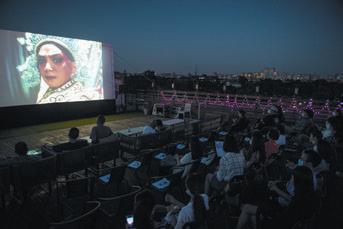Raising the Curtain
By Li Qing
Hao Xins friends would have been stunned to know that last month, when she told them she was going to watch a movie. She went to see a fi lm released in 1998. But for the college student, watching Steal Happiness, a light comedy based on the life of an average Chinese family, was an engrossing activity on two counts. Its an evergreen tale that won the Audience Award at the Far East Film Festival in Italy in 2011. Also, Hao watched it in the open air and it revived the happy memories of her childhood, when she would watch fi lms outdoor with her family in summer.
The open-air screening was part of the 10th Beijing International Film Festival (BJIFF), held from August 22 to 29, which showed fi lms outdoors for the fi rst time to introduce over 20 classics as well as maintain social distancing.
“It was very similar to my childhood experience when people watched interesting films in the open without the restraints in cinemas. They enjoyed the time with their friends in a casual way, talking and discussing the plot,” Hao told Beijing Review.
Originally scheduled for April, the festival had to be postponed to ensure public health and security. The customary red-carpet opening, which brought in international stars in the past, had to be cancelled.
However, Zhang Yimou, one of Chinas best-known filmmakers who also directed the opening and closing ceremonies of the 2008 Beijing Summer Olympic Games, said the film industry must carry on despite the immense hardship brought by the pandemic.
“We must continue our efforts to create new stories that touch the audience and give them power,” he said at the opening ceremony on August 22. “There are more Chinese stories that we need to tell the world.”
New trends
Lin Shifeng, who runs a popular account on Chinese social platform Weibo with over 5 million followers, has been following BJIFF since it was started in 2011 by the China Media Group and the Beijing Municipal Government. “The festival always provides good choices for viewers with its interesting and unique themes. That was not hampered by this years scaling down due to the epidemic,” he told Beijing Review.

This year, besides acknowledged masterpieces and restored fi lms, there was a section, Womens Voice, designed around womens dilemma and development. A poll conducted by China Global Television Network (CGTN) called it the most exciting topic in the festival. It included Like the Dyers Hand, Chen Tsun-shings documentary on Chinese classics expert and poet, the 96-year-old Yeh Chia-ying, and Kim Ji Young: Born 1982, the directorial debut of Kim Do Young from the Republic of Korea, which tells the story of a young woman seemingly possessed by her mother and grandmother.
“For previous fi lm festivals, we often chose mature, strong and respected female figures, but this year we chose many complicated fi gures, including weak, strong and wise ones,”Jiang Yi, curator of the 10th BJIFF, told CGTN. “It was to ensure that more female voices were heard.”
In addition to the outdoor screenings, this was also the first time the festival chose the small screen as a channel where 10 foreign fi lms were aired. Multiple mediums, combining the Internet and theaters, create more opportunities, Zhang Xiaoguang, Deputy Director of the China Film Art Research Center, said at a press conference in Beijing on August 13. Over 300 fi lms were screened on diverse platforms during the festival.
As part of BJIFF, Beijing Media Network launched a unique program of short videos and interviews. It invited filmmakers like Wu Jing, director of the blockbuster action fi lm Wolf Warrior, and also the image ambassador of this years festival, to discuss their creative processes and their thoughts on the industrys recovery and development.
Other events included the 27th Beijing College Student Film Festival, an online masterclass by Austrian director Jessica Hausner and Chinese director Stanley Kwan, forums and a photo exhibition looking back on Chinese fi lm development history.

In addition, fi lm projects were promoted for investment on an online platform. There were over 800 projects, up 13 percent compared to last year.
This was also the fi rst time that moviegoers on the Chinese mainland had the thrill of being able to decide themselves the direction of a story and the fate of its hero. Late Shift, a crime thriller by Swiss director Tobias Weber, is the story of a student who is dragged into an auction house theft. The interactive fi lm has seven different endings and the viewers can decide which one it will be by using a mobile app.
The festival also provided free booths to global film institutions, supported by 3D and virtual reality technologies.
Talking about the impact of Internet platforms on traditional cinema, Lu Chuan, a fi lmmaker and producer, said they should support each other. At a BJIFF roundtable on August 22, he said, “There will certainly be competition, but they have a respectful relationship with each other.” He gave acclaimed American director Marin Scorseses 2019 crime thriller The Irishman as an example. It had a limited release in theaters and was also streamed on Netflix, becoming one of its most profi table ventures.
Beijings role
Lu called Beijing a city that can inspire young directors creativity and help them create infl uential fi lms in the future. “BJIFF, as the most important international film festival in Beijing, should showcase these resources and talents to the world,” he said.
When tickets for BJIFF went on sale online on August 19, over 70 percent sold out within 10 minutes. Tickets for Like the Dyers Hand sold out in five seconds. The regulation that only 50 percent seats in a cinema should be occupied to maintain social distancing made it more challenging to get a ticket.
“It is a critical time for the industry since cinemas in China have reopened about a month ago,” Lin Shifeng said. “It is a signal that people can return to cinemas with health security measures in place.”
To revitalize the film market affected by the novel coronavirus epidemic and reignite peoples enthusiasm for the cinema, the city authorities in Beijing are offering movie ticket coupons worth 10 million yuan ($1.4 million) to residents.
Fu Ruoqing, Vice President of China Film Co., said the Chinese movie market is recovering. “More than 8,500 cinemas have reopened, and a string of high-profi le new fi lms and classic blockbusters are set to release. With all industry players efforts, the domestic film industry will keep developing,” he said during BJIFF.

